One sweltering summer we invited our partners in Thailand for a round of meetings in Karachi. The year was 2006 and the city was mostly dug up as newly found money for development made way for flyovers, underpasses, road extensions and traffic intersections. We tried out the full banquet of dust as we drove from Chundrigar Road to Press club, from Press club to FTC, from FTC to PIDC, from PIDC to Zamzama and then back to the Marriot. When I apologized to Somkiat, my friend from Thailand about the traffic jams and the development work in progress all across town he said it reminded him of Bangkok just before the Thai economy took off. I can feel the momentum, he said. Don’t trust everything you read in the Economist, this country is going places.
That was eleven years ago. Despite everything we read, despite the persistent negative coverage, despite the once a month rants of outrage by a few of my vocal friends this country is going places. Has gone places. I know I have been watching and living it for the last three decades. Things haven’t gotten much worse, they are much better. Don’t take my word for it. Look at the fringes, the edges of your daily routine and you will see what I have been seeing myself all these year.

A thriving cultural and art scene lags economic development, growth and prosperity. When communities start paying for theater plays, stage performances, musical evening; when they start supporting artists, it indicates that they (the city in question) have finally found their groove. We spend on entertainment and arts when we have the emotional budget and flexibility to sit back and relax. When our neighbors, our students, our friends and children start getting involved in artistic endeavors we know that the circle of light is spreading.
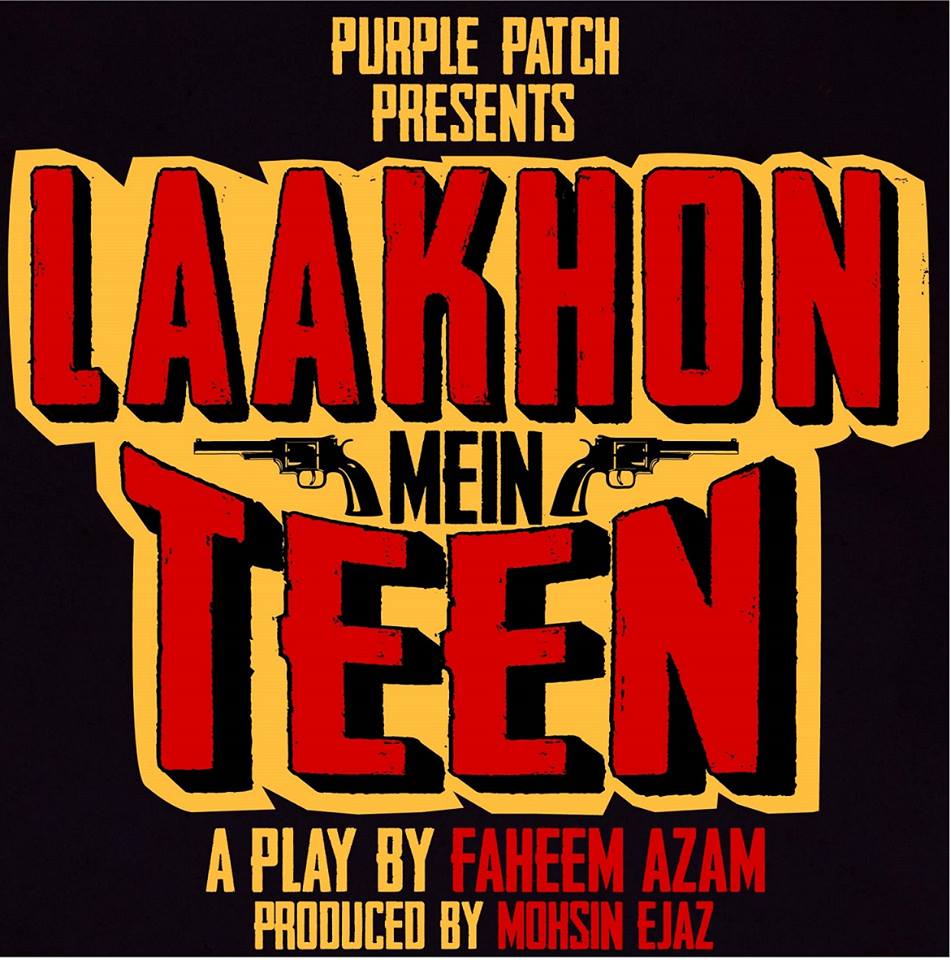
In 2014 I accidently stumbled upon Three in a million (Lakhon mein teen), a stage play organized by Faheem Azam at the arts council. Shahjahan Chauhdry through his infinite network of connections arranged free tickets first for the curtain raiser and then for one of the main night. I loved the show so much that I took my aunts, my eldest son and my mother with me to the performance.
The play centered around three mental patients at an asylum who escape and decide to rob a bank. The plan goes asunder as mad schemes tend to do and then the plot takes a turn and leaves you with an unexpected punch in the gut. Faheem’s work wasn’t just light hearted comedy it was bitter social commentary sweetened by the medium he chose to present it in.
I kept on seeing Faheem and his comedy troupe in action at improv, standup comedy and stage shows over the next two years. Junaid Malik and Sana Khan Niazi, both incubates and founders at Nestio, a startup incubator I volunteer with, became part of Faheem’s circle and launched their careers as standup comedians.
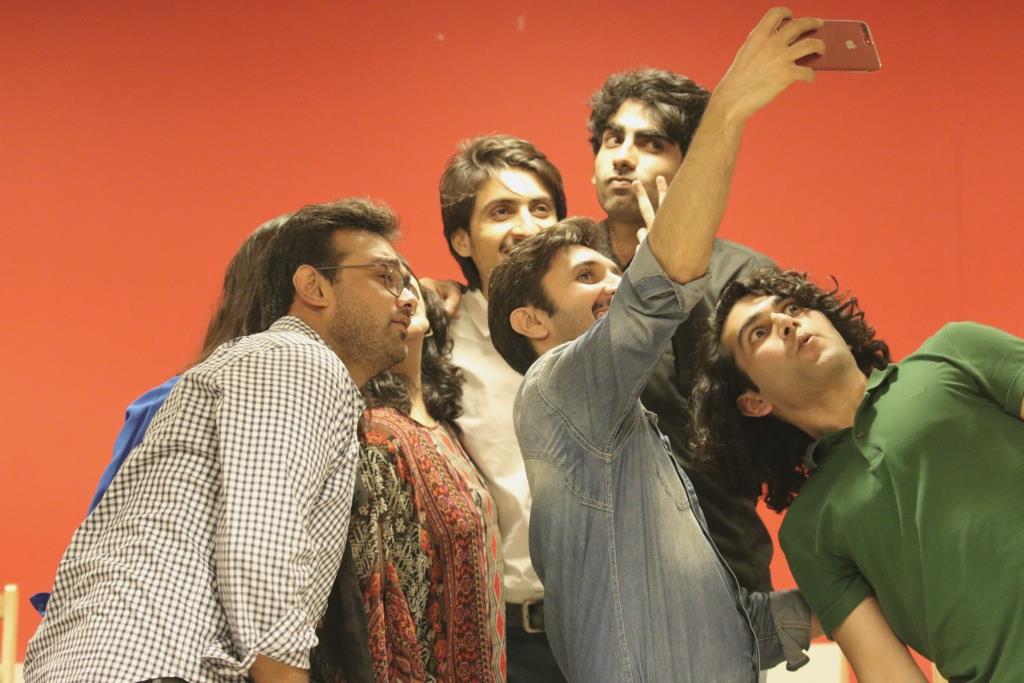
It was through them, at their shows, when I saw Faheem come in as a helping hand, open up shows, fill in the gaps, encourage audiences to support budding artists that I realized the impact of his work and his contribution. More important than his own personal performances, Faheem opened doors, held hands and showed the way to new artists who needed help breaking out with Karachi’s tough audiences. Comedy scene the support group that helps budding comics find audiences in Karachi now includes more than 90 performing artists within its rank. They do an open mike night once every two weeks. A year ago the group had less than 5 comics; their best effort a show once in four months.
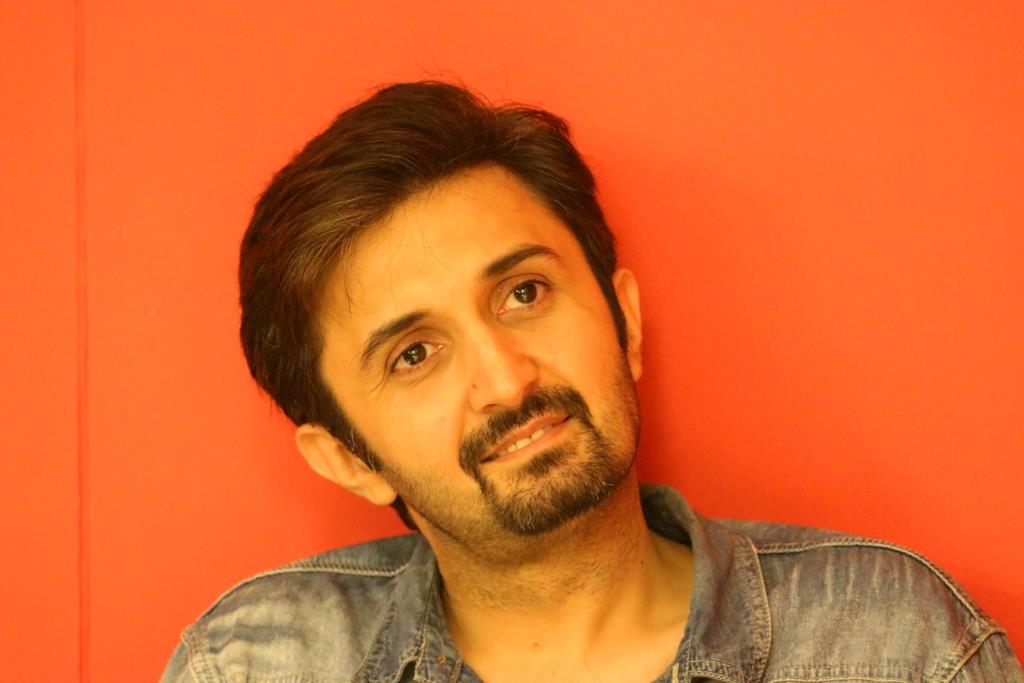
Faheem is just one of the many influencers and artists driving the revival of stage movement in Karachi. He is the one I see because our circles overlap but he is not the only one. Take a look at NAPA Repertory Theater’s Facebook page and you get a sense of upcoming shows lined up at just one city venue. Remember this is art – not twisted cable and television affairs produced for playing the ratings game nor fantasy commercial films with no connection to reality or life. In many instances it is social commentary – produced by artists who feel, for audiences who connect. Viewers who not just connect but are willing to pay for the privilege of seeing talent perform on a medium we thought we had lost.
To witness how far this city has come, wake up early on a Sunday morning and drive down to the beach. You will have to leave at first light to make it to Seaview by 6:20 am. At the entrance of a major fast food chain near the beach at Clifton you will see a mass of colors and bicycles assembled for an early morning ride. This is the Critical Path gang. Kids, mothers, fathers, teen agers and middle aged fitness fans all standing together to enjoy their hour long bike ride that starts at the intersection of Beach road and Khayaban-e-Shamsheer.
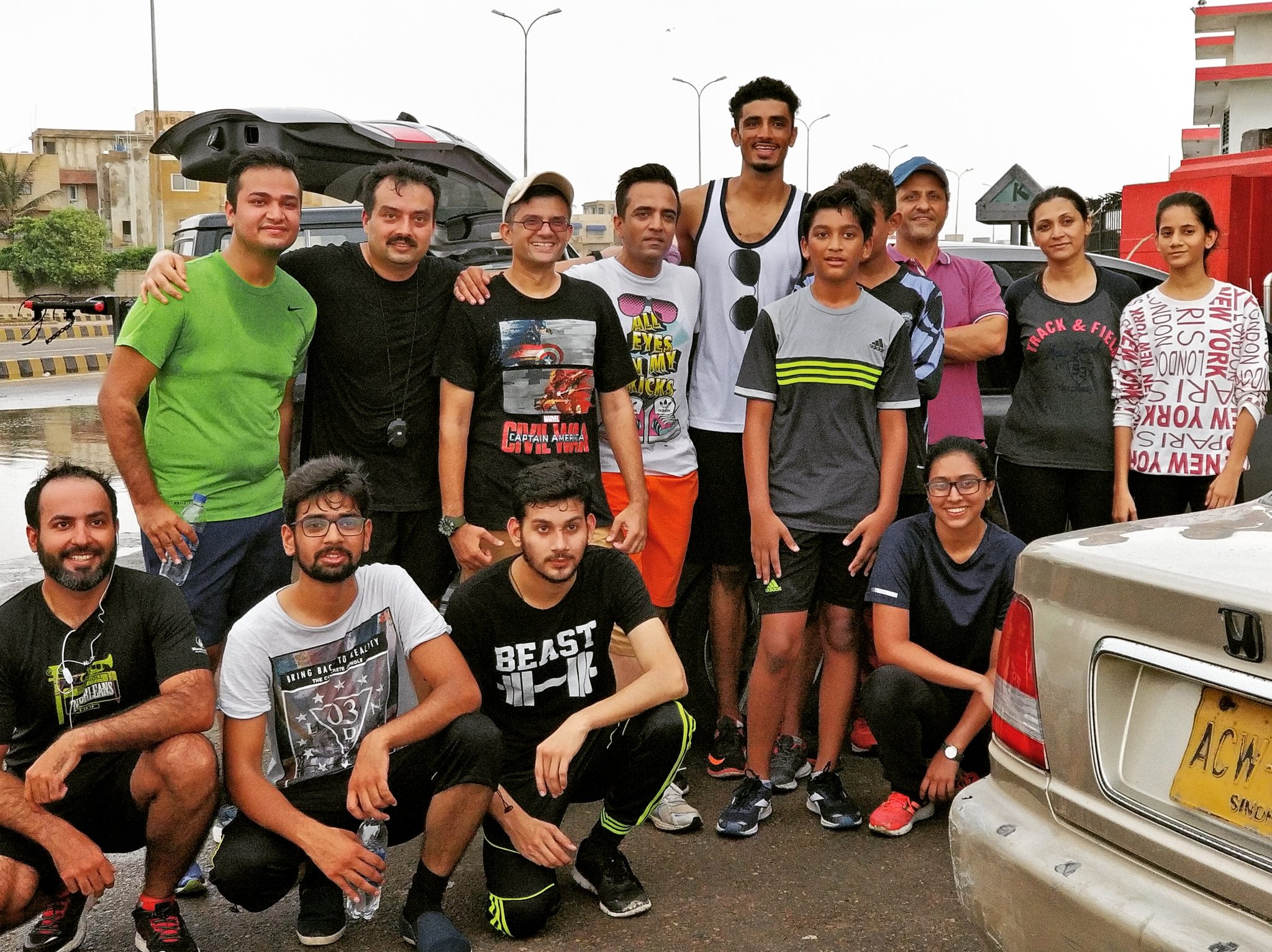
Wait ten minutes. As the cyclists leave and the space clears up you will see a much smaller group of individuals on the side stretching their legs. Also dressed in multicolored running kits this group doesn’t have any bikes. Meet the road warriors of Karachi – twenty odd men, women and teenagers who run a 6.6km stretch of the road every Sunday morning at 6:40 am. The youngest kids in the group are a bunch of 11 and 12 years old. The eldest a 46 year old couple. There are two 16 year olds who run the 6.6k stretch in less than 24 minutes. A national junior champion who runs the short sprints but does this run every week. Two coaches who also run an athletics club at NCC and a group of distance runners. The average pace for the group, other than the seasoned distance runners, between 32 and 40 minutes for the distance.
The group started with two people who wanted to run a 5K (5 km) on the beach together. Over a year the 2 became 5. The 5 ran into an athletic club that organized a cross country championship across multiple age groups in February. The athletic club went for a beach run in July and ran into the distance runners again. The 5 became 10 and this weekend after four jointly organized beach runs the 10 turned into 25.
If an early Sunday morning is too much to ask head off to the National Coaching and Training center at stadium road on any week day evening. You would think you have come to a festival of children. The fading tartan track and the evergreen football fields are overflowing with young athletes and their parents. You need to see the hustle of feet and footballs kicked around not as a promise of the city’s future athletic performance but as kids being kids. Chasing dreams, training, running, falling and bonding with their team mates.
Dalmia dreaming – the quest of one athlete and his village to claim the national sprint title.
Social movements in theater, athletics and sports don’t occur or begin overnight. I can trace the memory of a movement to preserve theater as an art form to my child hood, to frequent stage plays on the PACC stage. Regular enough that attending stage performances with my siblings and parents is one of the most endearing memories of my childhood. Remember this was the 80s where all forms of social expression were strictly regulated and censored. Where there was a single family friendly stage in Karachi. Where art wasn’t popular enough to pay the bills or feed your family.
It may not have had the same momentum but it was this movement that directly lead to the foundation of NAPA, the construction of the arts council theater and the arrival of multiple groups dedicated to putting together a show for the city once every few months. If we go back far enough, we should be able to trace it that one person who started it all. The drive we see today began four, maybe five decades ago with the actions of a single individual who wanted to preserve this art form for posterity. I don’t know who this individual was but I owe him or her a debt of gratitude. It is because of this one person that my kids can personally experience and explore the magic that is stage today.
The same holds true for athletics. One person 70 years ago decided that my children, three generation later, should have the joy of discovering athletics, with trained coaches, with a calendar of competition, with a tartan track. He dedicated his life to bringing that dream to fruition. He didn’t live to see it but his efforts are what created the momentum that made it possible for Salwa, Amin and Taha to do what they do today. He was the drive behind Pakistan Sports Board, he conceived National Coaching Center and Liaqat Gymnasium and made them possible, he trained the first generation of coaches and athletes and drove the generation that gave us the six odd athletics club in the city today. One person. One individual. I am not going to tell you his name. Go look it up. Here is a hint that will help. Start in 1948.
Think about it for a second. Everything we have today we have because someone in a prior generation said enough is enough. I am going to do something to fix this. I may not live to see the day but I will start. One person, one individual, one movement.
Not all movements begin with a history lesson. I am a computer scientist because Aga Hassan Abidi and Saleh Naqvi started the FAST foundation to fund computer science education in Pakistan in 1980. That was 37 years ago. My children and their classmates got exposure to computer science in class 8th and 9th because Aga Hassan Abidi and Saleh Naqvi said enough in 1980. The gift they gave me in the late 80’s made it possible for me to teach my children and their classmates Scratch at their school in 2015 and 2016. It was their gift that made it possible for Amin to take computer science subject in A levels in 2017.
What movement are you going to start today that will keep on giving 70 years later? What is going to be your legacy, your movement, your gift to the next generation?
Not all movements require an endowment. Some just require empathy and a willingness to take a stand and make a difference. Whatever your cause is, you have to start, you have to contribute. Begin with the building, start with giving. And you really have to stop complaining. This means you Faizan Siddiqi. Stop using oblique references to people, stop hiding behind difficult words. Start naming them. That too is a beginning.
It can be as small a change to committing to keep your own lane clean of plastic bags, debris and garbage; of teaching a young child science, math or language; a skill with which he or she can earn a living; of showing up at a stage show or theater production with a friend and filling up the seats so that a young talented artist doesn’t go home with a broken heart.
If you can’t start a movement, join one. If you can’t join a movement contribute to it, help raise awareness and funding for the cause. The least you can do is write a check for a worthy cause that you believe in. If you can’t do any of the above begin with not flipping the finger at the motorcycle walas; stop honking the horn; with giving way the next time you are at the intersection.
Why the emphasis on complaining?
I had gone to hear the late Eqbal Ahmed speak at an event organized by Hakim Saeed. I knew my father loved Eqbal Ahmed’s work and respected his opinion. But I was too opaque or too young or both to appreciate the words Eqbal sahib wrote in his weekly Dawn column. He spoke eloquently for twenty minutes and then started answering questions. Someone in the audience asked him about the depressing state of affairs in the country and his advice to the audience. Remember this was the nineties. As a nation we have always suffered from collective depression irrespective of how good or bad things are.
Twenty two years later I still remember his words. He said:
“If you want to bring about positive change you have to do two things. First you have to contribute. It doesn’t matter how small or meaningless your contribution is, it adds up in the long run. Second you have to stop complaining. Like contributions, negativity also adds up in the long run. You have no idea who you will send packing with your words. I am not asking you to be an ostrich. I am asking you to stop being the last straw that would break some poor well meaning, well intentioned contributor’s back. Be positive. Things change every day for the better. You are too close to see or observe them.”
Stop complaining, walk away from negativity, be positive. And don’t forget to contribute.
Rama is a ten year old high functioning autistic child who likes to sing. Ahmed is her 8 year old classmate who likes to whistle. Taha, their twelve year old senior, likes to dance. They all have music in their souls but express it differently from the world around them.
All three are on the autism spectrum, all three have special needs when it comes to education and learning. All three were failed by main stream schools in Karachi. They have no space for these children. Some will take them in, some will try and help, some will make an effort but to be fair a special needs child needs a lot more support than a regular student. A commercial school’s business model cannot work with them.
At their current school the three children work with three teachers, one therapist and two volunteers to cover an activity oriented curriculum that balances mathematics, language, social skills, yoga and behavior management.
Taha’s school, their school, opened up two years ago with two and a half rooms, a single student and a single teacher. It was named Taha’s school because Taha was the only student in it. It was made possible by two gifts of love by Taha’s grandparents and a community of unconditional support around special needs children in Karachi.
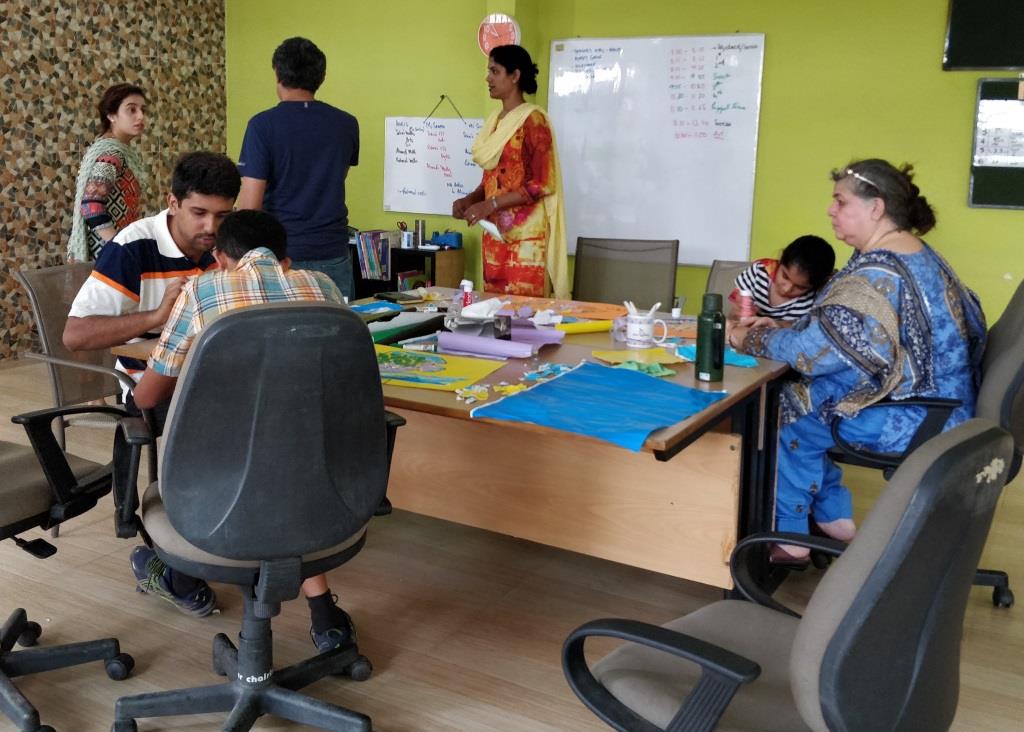
Rama, Ahmed and Taha can do what they do because we as a society believe in giving more and taking less. As long as we believe and preserve just this one single attribute, as long as you help preserve and continue this tradition, our children will have a future. As long as they have a future, we do too.
I know I sound like a broken record but you don’t build futures by complaining. You build them by contributing. Stop complaining. Start contributing. Every little bit counts. Don’t belittle anyone or their contribution, however small, however insignificant it may be.
Even if you touch a single life that means something. You don’t have to reach a billion souls. Change what you can within your circle of influence. Start with a pinprick, with one person, with one life. Give that one life meaning. Turn that pinprick into a smile, that smile into a circle.
My father used to say this all the time. What is one divided by zero? Infinity. That is what you get when you complain. What is one divided by one? One. You can bridge the distance between infinity and one by just lifting your hands and contributing. Pick a problem, bridge the distance. Contribute. Rather than being the zero, be the one.
What will be your contribution today? Will someone look back seventy years down the road and name your name? Will they say a prayer of thanks like I do for my elders and the generation that gave me everything, every few months? Will you build something on the foundation that your parents, your elders and your family have given you? Will you give more than you receive? What will you build today?
